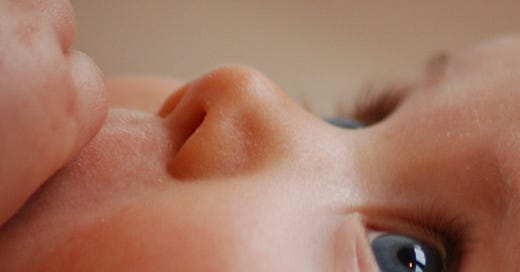* The Y-axis does not start at 0, in order to emphasize the baseline trend and change in mortality rate.
Data sources:
1. Weekly epidemiological reports published by the Israeli Ministry of Health (IMOH)
2. The latest monthly journal published by Israel's Central Bureau of Statistics (CBS)
Notes:
1. The raw data is available online.
2. The number of live births in 2022 is not final, it may increase up to 0.5% which will indicate a 9.3% rise in mortality rate instead of 9.8% .
3. There is an inconsistency between the rates calculated using IMOH's epidemiological data and those published by the CBS in earlier years. The graph above is based on the most updated data available.
Infant mortality rate in Israel

Infant mortality rate in Israel has been declining almost constantly for decades. According the graphs above there hasn’t been such a drastic, two-year rise until now. Compared to 2018-2020 average, 2021 and 2022 exhibit a 5.2% and 9.8% rise in IMR (age <1 year), respectively.
The matter appeared in municipal (not national) press, such as in this article from March 2023 titled: "Within 70 days: 20 babies in Jerusalem died in their sleep". The article also quotes an unknown senior medical source in Jerusalem: "In the last year I notice cardiac arrest in babies which is very typical to wintertime, although there have been some cases in the summer. I cannot explain this."
The weekly reports support this claim. The summer of 2022 had an unusual rise in infant deaths.
Discussion
There could be several factors involved. One possible cause is an immunity debt of mothers and infants due to lockdowns in 2020-2021.
Another possible cause are the Covid-19 vaccines. In Israel, shortly after the beginning of the vaccination campaign, Pfizer's BNT162b2 vaccine was authorized and recommended by the IMOH to pregnant women, claiming they were in increased risk of severe Covid-19 illness. This was recommended despite the fact that pregnant and breastfeeding women were excluded from Pfizer's trials and other trials. The results of Pfizer's trial in pregnant women have not been published yet (according to this response dated Feb. 2023) although the trial had already ended on July 2022. Other researchers did find mRNA traces in breast milk (JAMA Pediatrics).
The vaccination status of the mothers could not be retrieved via FOIA requests. Further research is required to test for possible causal connection between vaccines and the rise in IMR.
The above data relates to the whole country. We will be publishing data from specific hospitals in the future, including vaccination status of the pregnant women.
Please subscribe and share IsraeLab substack with your colleagues.




